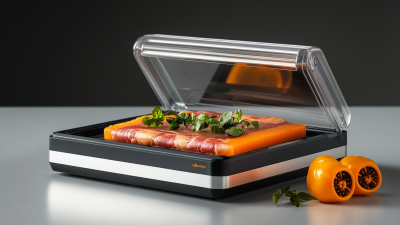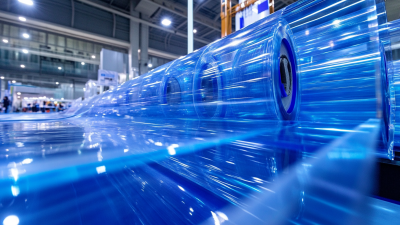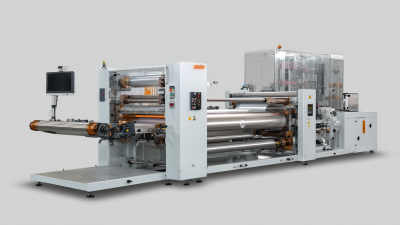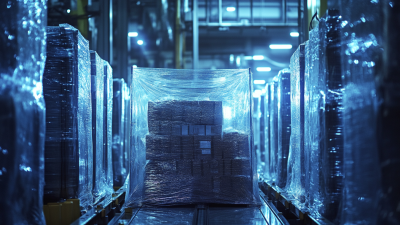Essential Guide to Choosing the Right Heat Sealing Machine for Your Business Needs
In today's fast-paced packaging industry, the selection of the right Heat Sealing Machine is crucial for businesses striving for efficiency and quality. According to a recent report by MarketsandMarkets, the global packaging machinery market is projected to reach USD 47.12 billion by 2026, with heat sealing technology playing a significant role in this growth. As companies increasingly seek to optimize their production processes, understanding the various types of heat sealing machines available becomes essential. Various industries, from food and beverage to pharmaceuticals, rely on these machines to ensure product integrity and extend shelf life. This guide will explore key strategies for choosing the ideal heat sealing machine that meets your business needs, considering factors such as material compatibility, production volume, and budget constraints.

Key Factors to Consider When Selecting a Heat Sealing Machine for Your Business
When selecting a heat sealing machine for your business, several key factors must be considered to ensure you meet your operational needs effectively. The global vessel sealing devices market highlights the significance of advanced sealing technologies, with projections estimating growth from $21.15 billion in 2025 to $32.85 billion by 2032, reflecting a robust CAGR of 6.5%. This growth indicates a rising demand for efficient and reliable sealing solutions, emphasizing the necessity for businesses to invest in suitable machinery.
One crucial aspect to consider is the type of materials you will be sealing. Different machines are designed for various materials, such as plastic, film, or foil. Evaluating the features of the machines, such as suction power, sealing speed, and ease of use, can significantly affect your production efficiency. Furthermore, budget constraints should not overshadow the importance of quality and durability. Investing in a reliable machine can reduce long-term costs by minimizing breakdowns and maintenance needs. By focusing on these essential factors, businesses can make informed decisions that align with their specific requirements and contribute to their growth in an increasingly competitive market.

Comparing Different Types of Heat Sealing Machines: A Comprehensive Overview
When selecting a heat sealing machine for your business, understanding the various types available is crucial. Heat sealing machines come in several forms, including impulse sealers, constant heat sealers, and vacuum sealers.
Impulse sealers are ideal for short production runs, as they generate heat only when the sealing arm is lowered, minimizing energy consumption. They are widely used in packaging food, electronics, and other products that require airtight seals.
On the other hand, constant heat sealers are designed for high-volume production, providing continuous heating, which enables faster sealing processes. These machines are suitable for thick materials and heavy-duty applications but may require more maintenance to ensure they operate efficiently.
Vacuum sealers, commonly used in food packaging, remove air from the packaging process, extending shelf life and preserving freshness. Each type of heat sealing machine offers unique advantages, and businesses should assess their specific needs, including production volume and material compatibility, to select the most suitable solution.
Understanding Industry Standards and Regulations for Heat Sealing Equipment
 When selecting a heat sealing machine for your business, it's crucial to understand the industry standards and regulations that govern these types of equipment. The International Organization for Standardization (ISO) sets specifications that are widely recognized across the manufacturing sector, including ISO 11607, which focuses on the packaging of terminally sterilized medical devices. Adhering to such standards not only ensures compliance but also enhances product safety and reliability. For example, a report by MarketsandMarkets indicates that the global heat sealing equipment market is projected to reach $4.4 billion by 2026, driven largely by the growing demand in the food and pharmaceutical industries, where stringent packaging regulations are paramount.
When selecting a heat sealing machine for your business, it's crucial to understand the industry standards and regulations that govern these types of equipment. The International Organization for Standardization (ISO) sets specifications that are widely recognized across the manufacturing sector, including ISO 11607, which focuses on the packaging of terminally sterilized medical devices. Adhering to such standards not only ensures compliance but also enhances product safety and reliability. For example, a report by MarketsandMarkets indicates that the global heat sealing equipment market is projected to reach $4.4 billion by 2026, driven largely by the growing demand in the food and pharmaceutical industries, where stringent packaging regulations are paramount.
Additionally, regulatory bodies like the Food and Drug Administration (FDA) in the United States impose specific guidelines on heat sealing technologies to ensure that packaging maintains product integrity and safety. According to the FDA's Packaging Regulatory Framework, businesses must conduct thorough validation studies to demonstrate that their sealing equipment produces consistent, reliable seals. Companies that fail to comply with these regulations risk costly recalls and damage to their reputation. Investing in the proper heat sealing machinery that meets these standards not only positions a business for success but also protects its customers and brand in a competitive market.
Cost Analysis: Balancing Budget and Quality in Heat Sealing Machines
When selecting a heat sealing machine, balancing budget and quality is crucial for ensuring long-term success. Initially, businesses often prioritize lower costs, but this may lead to compromising on the performance and durability of the machine. Low-budget models might save money upfront, but they can result in frequent repairs or replacements, ultimately increasing overall costs. It’s essential to consider the total cost of ownership, including maintenance and potential downtime, which can disrupt production and affect profitability.
Investing in a higher-quality heat sealing machine may require a larger initial outlay, but the benefits are significant. Quality machines typically provide better sealing performance, increased efficiency, and extended lifespan. They can handle a wider range of materials and offer consistent results, which is vital in maintaining product integrity and reducing waste. When evaluating options, businesses should conduct a thorough cost analysis that encompasses both the purchase price and the operational efficiency over time. By doing so, they can make informed decisions that balance their budgetary constraints with the need for reliable and effective sealing solutions.
Essential Guide to Choosing the Right Heat Sealing Machine for Your Business Needs - Cost Analysis: Balancing Budget and Quality in Heat Sealing Machines
| Machine Type | Average Cost ($) | Seal Width (inches) | Production Speed (units/hour) | Warranty (years) | Recommended Applications |
|---|---|---|---|---|---|
| Impulse Sealer | 250 | 12 | 100-200 | 1 | Small Packaging |
| Continuous Band Sealer | 800 | 16 | 300-600 | 2 | Food Packaging |
| Vacuum Sealer | 500 | 10 | 50-100 | 1 | Meat and Cheese Packaging |
| Pneumatic Sealer | 1500 | 24 | 500-800 | 3 | Heavy-Duty Use |
Performance Metrics: Evaluating Efficiency and Output of Heat Sealing Solutions
When it comes to choosing the right heat sealing machine, performance metrics play a crucial role in determining efficiency and output. According to a recent report by MarketsandMarkets, the global market for heat sealing machinery is expected to grow at a CAGR of 5.8%, reaching USD 835 million by 2025. This growth highlights the increasing importance of evaluating the operational efficiency of heat sealing solutions. Key performance indicators, such as sealing speed, temperature consistency, and energy consumption, should be closely monitored. Machines that offer rapid sealing cycles can significantly enhance productivity, making it essential to consider machines with adjustable speed settings to match production demands.
Tips for evaluating efficiency include examining the machine's energy consumption profile. A machine that boasts lower energy usage while maintaining high output can lead to significant cost savings in the long run.
Additionally, consider the scalability of the equipment; as production increases, the ability to adjust output without sacrificing quality will be crucial. Investing in a machine with advanced controls and monitoring systems can provide real-time insights into performance, enabling businesses to optimize their operations continuously and reduce downtime.
Related Posts
-

Top Strategies for Optimizing Your Packaging Equipment Efficiency
-

Innovative Strategies for Choosing the Best Tray Sealing Machines in Global Markets
-

Top 10 Shrink Wrap Film Manufacturers in China at the 137th Canton Fair
-

How to Identify Reliable Suppliers for the Best Heat Shrink Wrap Machine Globally
-

2025 Insights on Best Shrink Wrapper Trends and Performance Comparison
-

7 Compelling Benefits of Investing in a Packaging Machine for Your Business
